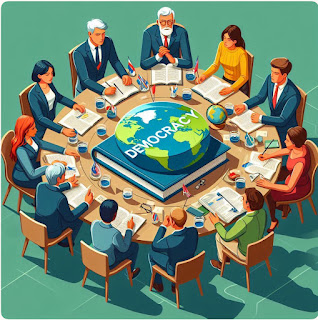Reshaping Democracy Governance System

Introduction The current democratic system heavily relies on the election system, where people elect representatives from their communities or local influencers. However, this system often leads to conflicts, violence, war, and corruption. To address these issues, we propose an alternative voting system that utilizes advanced technology to create a more sustainable and inclusive democracy. Summary The proposed advanced democratic governance method involves a set of actors with specific responsibilities, fostering innovation and transparency. The system prioritizes deep relationships and clear communication between actors, the governance model, and citizens. By involving common people in the decision-making process, we aim to achieve inclusiveness, reduce corruption, violence, and inequality, ultimately leading to a sustainable future. The Actors The key actors in the proposed governance model include: 1. Corporate leaders 2. Politicians 3. Judges 4. Civil employees 5....
